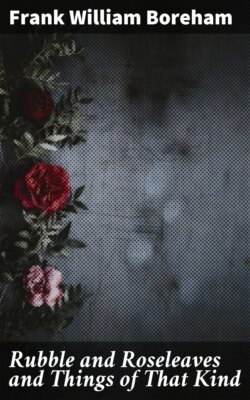Читать книгу Rubble and Roseleaves and Things of That Kind - Frank William Boreham - Страница 11
На сайте Литреса книга снята с продажи.
I
ОглавлениеTable of Contents
The green chair was never occupied. It stood—according to Irving Bacheller—in the home of Michael Hacket; and Michael Hacket is the most lovable schoolmaster in American literature. Michael Hacket possessed a violin and a microscope. The romps that he led with the one, and the researches that he conducted with the other, represented the two sides of his character; for he was the jolliest soul in all that countryside, and the wisest. But, in addition to the violin and the microscope, Michael Hacket possessed a green chair; and the green chair was even more valuable, as a revelation of the schoolmaster's character, than either the microscope or the violin. Barton Baynes, the hero of the story, went as a boarder to Mr. Hacket's school; and the green chair deeply impressed him. When the family assembled at table, the green chair, always empty, was always there. Before he took his own seat, Mr. Hacket put his hand on the back of the green chair and exclaimed:
'A merry heart to you, Michael Henry!'
It was a rollicking meal, that first meal at which Barton was present; the schoolmaster was full of quips and jests; and his clever sallies kept everybody bubbling with laughter. Then, when all had finished, he rose and took the green chair from the table, exclaiming:
'Michael Henry, God bless you!'
'I wondered at the meaning of this,' says Barton, 'but I dared not ask.' Shortly afterwards, however, he summed up courage to do so. Mr. Hacket had gone out.
'I've been all day in the study,' the schoolmaster had said; 'I must take a walk or I shall get an exalted abdomen. One is badly beaten in the race of life when his abdomen gets ahead of his toes. Children, keep Barton happy till I come back, and mind you, don't forget the good fellow in the green chair!'
He had not been long gone when the children differed as to the game that they should play. A dispute was threatening.
'Don't forget Michael Henry!' said Mrs. Hacket, reprovingly.
'Who is Michael Henry?' asked Barton.
'Sure,' replied Mrs. Hacket, 'he's the child that has never been born. He was to be the biggest and noblest of them all—kind and helpful and cheery-hearted and beloved of God above all the others. We try to live up to him.'
'He seemed to me,' said Barton, 'a very strange and wonderful creature—this invisible occupant of the green chair. Michael Henry was the spirit of their home, an ideal of which the empty chair was a constant reminder.'
When a conversation threatened to become too heated, it was always Michael Henry whose ears must not be offended by harsh and angry tones; it was Michael Henry who had begged that a culprit might be forgiven just this once: it was Michael Henry who was always suggesting little acts of courtesy and kindness.
'I like to think of Michael Henry,' the schoolmaster would say. 'His food is good thoughts and his wine is laughter. I had a long talk with Michael Henry last night when you were all abed. His face was a chunk of merriment. Oh, what a limb he is! I wish I could tell you all the good things he said!'
But he couldn't; and we all know why.
There was no Michael Henry! And yet Michael Henry—the occupant of the green chair—pervaded like a perfume and ruled like a prince the gentle schoolmaster's delightful home!
